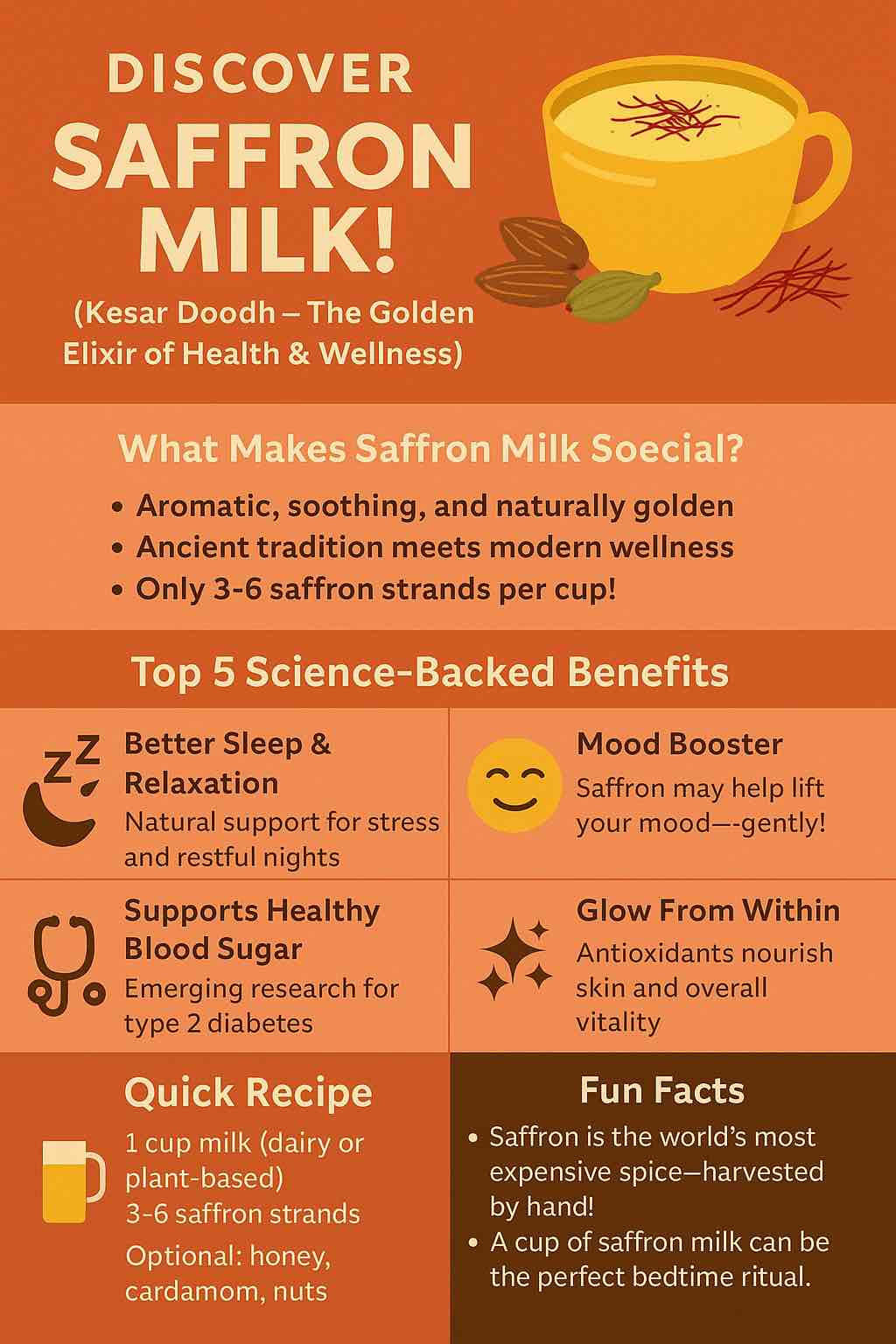
Turmeric Benefits for Skin and Face have been celebrated for centuries in Ayurveda and natural skincare. This golden spice, also known as haldi, is packed with curcumin — a powerful antioxidant and anti-inflammatory compound. Because of these properties, turmeric is often used to heal acne, fade dark spots, brighten skin tone, and restore a natural glow.
Modern research supports these claims—a 2016 systematic review of 18 human studies found that topical and oral turmeric improved multiple skin conditions, from acne to photoaging (PubMed).
Moreover, turmeric is incredibly versatile. It can be applied directly as a face mask, combined with oils for moisturizing, or even consumed as turmeric tea for inside-out skincare benefits. By understanding the full range of turmeric benefits for skin and face, you can use it more effectively and safely.
In this guide, we will explore 7 proven turmeric benefits for skin and face, along with DIY remedies, mask recipes, and tips to make the most of this ancient beauty secret. Whether you struggle with acne, hyperpigmentation, or simply want brighter skin, turmeric offers a natural and effective solution.
7 Proven Turmeric Benefits for Skin and Face
1. Turmeric Benefits for Acne and Pimples
One of the most well-known turmeric benefits for skin and face is its ability to fight acne. Thanks to its antimicrobial and anti-inflammatory properties, turmeric helps reduce breakouts while calming redness and swelling. In fact, studies suggest curcumin can inhibit acne-causing bacteria and balance excess oil production. As a result, regular application of a turmeric mask or paste may keep pimples under control more effectively than harsh chemical treatments.

In fact, researchers note that curcumin may be a well-tolerated, low-cost option for inflammatory skin diseases like acne and eczema (PMC).
2. Turmeric Benefits for Hyperpigmentation and Dark Spots
Another important turmeric benefit for face and skin is reducing hyperpigmentation. Curcumin, the active compound in turmeric, can slow down melanin production, which causes dark patches and uneven skin tone. Over time, using turmeric masks, scrubs, or even turmeric soap may help fade dark spots naturally. Moreover, pairing turmeric with lemon juice or honey can enhance these brightening effects.

Studies highlight curcumin’s inhibition of collagenase and elastase enzymes, which can otherwise worsen pigmentation and wrinkles. This explains why turmeric has been a key cosmetic in India for skin brightening rituals for centuries (IJDVL).
3. Turmeric Benefits for Glowing Skin and Brightness
If you are looking for a natural way to achieve radiant skin, turmeric is a proven option. Its antioxidants neutralize free radicals, while its anti-inflammatory nature improves circulation. This dual action restores skin’s natural glow and brightness. Additionally, drinking turmeric tea or golden milk provides inside-out nourishment, further supporting skin radiance.

Discover even more advantages in The Golden Spice: 5 Benefits of Turmeric for Skin Health.
4. Benefits of Turmeric for Anti-Aging and Wrinkles
With age, skin begins to lose elasticity and firmness. Fortunately, one of the less-discussed turmeric benefits for skin and face is its anti-aging power. Curcumin stimulates collagen production, improves hydration, and reduces fine lines and wrinkles. By using turmeric oil or turmeric-infused creams, you can promote youthful, supple skin without relying entirely on synthetic products.

Curcumin not only protects against free radical damage but also guards skin against UVB rays, improves collagen synthesis, and supports elasticity. A recent review emphasized curcumin’s role in anti-aging skincare and wound repair (MDPI).
5. Turmeric Benefits for Psoriasis, Eczema, and Sensitive Skin
For people struggling with skin conditions like psoriasis, eczema, or dermatitis, turmeric offers gentle relief. Its soothing nature reduces inflammation, itching, and scaling. In fact, both topical and oral turmeric have been found helpful in managing chronic inflammatory skin conditions. However, it is best to patch-test before using turmeric on sensitive skin to avoid irritation.

Learn how turmeric supports chronic skin conditions like psoriasis in our article Harnessing the Healing Power of Turmeric for Psoriasis.
6. Burnt Turmeric Benefits for Skin and Face
Recently, many people have been searching for “burnt turmeric” or “roasted turmeric” remedies. Traditionally, burnt turmeric is believed to improve absorption and healing when applied to skin. While scientific evidence is still limited, anecdotal reports suggest it may help with scars and pigmentation. Therefore, if you plan to try it, use small amounts, always patch-test, and pair it with a carrier oil like coconut or olive oil.

7. Drinking Turmeric Tea Benefits for Skin & Face
Finally, turmeric isn’t only about topical application. Consuming turmeric tea provides antioxidants and boosts natural detoxification. This helps reduce oxidative stress, which is one of the biggest causes of premature aging, acne, and dull skin. By drinking turmeric tea regularly, you support your skin’s health from the inside, making it more resistant to environmental damage.

Johns Hopkins highlights curcumin as a powerful polyphenol that improves overall skin resilience (Hopkins Medicine).
Other Popular Turmeric Benefits for Skin and Face
Turmeric Benefits for Melasma (Patchy Hyperpigmentation)
Melasma is stubborn, but turmeric can help reduce excess melanin activity over time. Apply a thin mask of turmeric, yogurt, and a few drops of almond oil 2–3 times weekly; then follow with sunscreen daily. Consistent, gentle use is key—expect gradual evening of tone rather than instant “whitening.”
Benefits of Turmeric with Vitamin C for Brightening
Vitamin C and turmeric work synergistically: curcumin calms inflammation while vitamin C supports pigment control and antioxidant repair. You can:
- Use a vitamin C serum in the morning, then a light turmeric gel/cream at night; or
- DIY a mask: 1 tsp yogurt + ½ tsp turmeric + a few drops of fresh lemon (vitamin C) for 10 minutes max.
Tip: If you’re sensitive, replace lemon with rose water to avoid stinging.
Turmeric and Black Pepper — Should You Use It on Skin?
Black pepper (piperine) is known to boost oral curcumin absorption. Topically, it’s often too irritating, especially on the face. If you want bioavailability benefits, drink turmeric tea with a pinch of black pepper and healthy fat (like ghee/coconut milk) and keep facial formulas pepper-free.
See how to maximize turmeric’s potency in Turmeric & Curcumin Absorption and Bioavailability.
Turmeric Scrub Benefits for Hyperpigmentation & Dark Areas (Inner Thighs/Bikini Line)
Friction and ingrowns can cause dark patches. A gentle scrub 1–2×/week helps:
- 1 tsp turmeric + 1 tbsp oat flour or sugar + 1 tbsp coconut oil.
Massage lightly for 60–90 seconds, then rinse. Follow with SPF if the area gets sun.
Important: Avoid scrubbing over active ingrowns or open lesions.
Turmeric for Hidradenitis Suppurativa (HS) — Supportive Care
HS is inflammatory and painful. While turmeric won’t “cure” HS, its anti-inflammatory action may soothe flare edges. Use a cool compress, then dab a thin mix of aloe gel + a pinch of turmeric around—not on—open lesions. Consult a dermatologist for primary treatment; consider oral turmeric (with medical approval) as supportive care.
Wound Healing / Burn Relief Benefit of Turmeric
Turmeric benefits extend beyond beauty. Animal model studies show topical curcumin accelerates epithelial healing and reduces inflammation in radiation-induced skin burns, suggesting possible uses in wound management (PMC).
Raw Turmeric vs Powder vs Oil – Which Is Best for Skin?
When it comes to using turmeric for beauty, many people wonder whether raw turmeric, turmeric powder, or turmeric oil works best. Each form has unique strengths, and choosing the right one depends on your skin goals.

Raw Turmeric Benefits for Skin and Face
Raw turmeric (often called kasturi haldi or wild turmeric) is one of the purest ways to use this spice for skincare. Because it contains high levels of curcumin and natural essential oils, it can brighten the skin, reduce acne, and give a natural glow. Moreover, unlike regular cooking turmeric, kasturi haldi is less likely to stain the skin yellow, which makes it a popular choice for face masks.
💡 Best use: Mix grated raw turmeric with yogurt, honey, or aloe vera for a DIY mask to fight pimples and dullness.
Turmeric Powder Benefits for Face & Skin Care
Turmeric powder is the most widely available and versatile form. It is rich in antioxidants and can easily be added to DIY masks, scrubs, and even soaps. In addition, turmeric powder works well for treating dark spots, pigmentation, and blemishes. However, it tends to stain the skin, so combining it with ingredients like milk or coconut oil helps tone down the yellow effect.
💡 Best use: Use a turmeric powder + chickpea flour (besan) mask to reduce excess oil and brighten skin tone naturally.
Benefits of Turmeric Oil for Face and Skin
Turmeric essential oil is a concentrated extract that delivers benefits more directly to the skin. Because it is potent, even a few drops mixed with a carrier oil (like jojoba, almond, or coconut oil) can help calm inflammation, fade scars, and moisturize deeply. Furthermore, turmeric oil is often found in serums and creams designed for hyperpigmentation and anti-aging.
💡 Best use: Apply diluted turmeric oil as a spot treatment for acne scars, fine lines, or dark patches.
Which Form Is Best?
- For everyday masks and scrubs, turmeric powder is the easiest to use.
- For sensitive skin or bridal glow routines, raw turmeric or kasturi haldi is preferred since it stains less.
- For targeted treatment of scars, dark spots, and wrinkles, turmeric oil is the most effective option.
In short, each type has a place in your skincare routine. By combining them smartly, you can unlock the full range of turmeric benefits for skin and face.
DIY Turmeric Masks and Remedies for Face
One of the easiest ways to enjoy turmeric benefits for skin and face is through simple DIY masks and scrubs. By combining turmeric with natural ingredients like honey, yogurt, or lemon, you can address acne, dark spots, dryness, and dullness without relying on harsh chemicals. Because Turmeric Benefits for Skin and Face vary by concern, choose the mask that targets your goal—acne, dark spots, glow, or dryness—and repeat it consistently.

Haldi Mask for Acne and Pimples
Haldi masks are a traditional remedy for acne-prone skin. Thanks to turmeric’s antibacterial and anti-inflammatory effects, these masks can reduce breakouts while calming irritation.
Recipe:
- 1 teaspoon turmeric powder
- 2 teaspoons chickpea flour (besan)
- 2–3 teaspoons rose water or plain yogurt
- Mix into a paste and apply for 15 minutes.
💡 Best for: Controlling oil, preventing pimples, and achieving a clear complexion.
Turmeric and Honey Mask Benefits for Clear Skin
Turmeric combined with honey creates a powerful antibacterial mask. Honey hydrates the skin while turmeric reduces redness and swelling.
Recipe:
- 1 teaspoon turmeric
- 1 tablespoon raw honey
- Apply to face for 10–15 minutes, rinse with lukewarm water.
💡 Best for: Acne, inflammation, and glowing skin.
Benefits of Turmeric and Lemon for Skin Brightening
When brightening and fading dark spots is the goal, turmeric and lemon juice are a great combo. Lemon contains vitamin C, which enhances the skin-lightening effect of turmeric.
Recipe:
- 1 teaspoon turmeric powder
- 1 teaspoon lemon juice
- 1 teaspoon yogurt (optional to reduce stinging)
- Apply evenly, leave for 10 minutes, rinse well.
💡 Best for: Hyperpigmentation, dark patches, and uneven tone.
Turmeric and Olive Oil Benefits for Dry Skin
For people with dry or flaky skin, turmeric mixed with olive oil provides deep moisturization while soothing irritation.
Recipe:
- ½ teaspoon turmeric
- 1 tablespoon olive oil
- Apply gently as a thin layer and leave for 10–15 minutes.
💡 Best for: Dryness, redness, and fine lines.
Benefits of Turmeric Scrub for Exfoliation
A turmeric scrub helps remove dead skin cells while brightening and refreshing the skin.
Recipe:
- 1 teaspoon turmeric
- 1 tablespoon sugar or oatmeal
- 1 tablespoon coconut oil
- Massage gently in circular motions for 3–5 minutes, then rinse.
💡 Best for: Glow boost, smoother texture, and skin rejuvenation.
For more pairings, natural, and DIY options, have a look at these posts and guides:
- Coconut Water Beauty Elixir: 5 Nourishing DIY Recipes for Skin and Hair
- 5 Aloe Vera Face Masks for Glowing Skin
- 7 Benefits of Cardamom for Skin (& 4 DIY Masks)
- Spice Up Your Skincare: 5 DIY Turmeric Masks for Radiant Skin
Safety Tips for Using Turmeric on Skin and Face
While the turmeric benefits for skin and face are powerful, it’s equally important to use this golden spice correctly. Because turmeric is highly pigmented and active, applying it the wrong way may cause stains, irritation, or other side effects.

Despite promising results, experts stress that clinical evidence is still limited, especially for deep wounds or burns (Cambridge Media). Harvard Health also notes that while turmeric is safe for most people, it may cause irritation if applied too frequently and should always be patch-tested first (Harvard Health).
Therefore, to enjoy the full range of Turmeric Benefits for Skin and Face without setbacks, always patch-test, avoid over-exfoliation, and wear sunscreen daily—especially when targeting pigmentation. Below are key safety tips to keep in mind.
Patch Test Before Applying Turmeric on Face
Before applying turmeric to your entire face, test it on a small area of skin (like your wrist or jawline). This ensures you don’t react with redness or itching, especially if you have sensitive skin or conditions like eczema.
💡 Tip: If irritation occurs, wash off immediately and discontinue use.
How to Reduce Turmeric Staining on Skin
One common concern with turmeric powder is that it leaves a yellow tint on the skin. This is harmless, but it can be annoying. To reduce staining:
- Mix turmeric with yogurt, milk, or honey instead of water.
- Wash off with a gentle cleanser after masking.
- Use kasturi haldi (wild turmeric), which is less likely to stain.
Safe Use of Turmeric Oil for Skin
Turmeric oil is potent. Never apply it directly to the skin; always mix a few drops with a carrier oil like coconut, jojoba, or almond oil. This prevents burning or irritation.
How Often Should You Use Turmeric Masks?
For most skin types, using turmeric masks 2–3 times per week is safe and effective. Overuse may dry out the skin or cause sensitivity.
Turmeric for Skin Whitening – Myth vs Reality
Many searches ask, “Is turmeric good for face whitening?” While turmeric does not bleach skin, it can brighten complexion by reducing pigmentation, scars, and uneven tone. In other words, turmeric helps reveal your natural glow rather than artificially “whitening” the skin.
For more on turmeric’s brightening effects as a glow mask, see Is Turmeric Good for Your Face?
Consult Before Using Supplements
While applying turmeric topically is generally safe, oral turmeric supplements can sometimes interact with medications or cause rare side effects like digestive issues. Always consult a healthcare provider before taking high-dose turmeric pills.
Check out 10 Serious Side Effects of Turmeric before starting supplements.
FAQs on Turmeric Benefits for Skin and Face
Q1. Is burnt turmeric good for skin and face?
Yes, burnt turmeric (or roasted turmeric) is a traditional remedy believed to help with scars, pigmentation, and wound healing. While scientific studies are limited, many still use it as part of natural skincare. Always mix with a carrier oil and patch-test before applying to avoid irritation.
Q2. What does turmeric do to skin and face?
Turmeric benefits for skin and face include reducing acne, calming redness, fading dark spots, and boosting natural glow. Its anti-inflammatory and antioxidant properties also improve skin texture and overall health.
Q3. What are the benefits of drinking turmeric tea for skin and face?
Drinking turmeric tea helps fight free radicals, reduce oxidative stress, and slow premature aging. These benefits support acne control, hydration, and glowing skin from the inside out.
Q4. What are the benefits of applying turmeric on face daily?
Applying turmeric on the face may reduce pimples, fade scars, brighten skin tone, and improve elasticity. It is often used in masks, scrubs, and spot treatments for acne, dark spots, and dullness. Always dilute turmeric with honey, yogurt, or oils to avoid staining.
Q5. Does turmeric make skin and face whiter?
No, turmeric does not bleach skin. Instead, turmeric helps reduce pigmentation, dark patches, and uneven skin tone, revealing a naturally brighter complexion. It is best considered a skin brightener and glow booster, not a whitening agent.
Conclusion
In conclusion, the many turmeric benefits for skin and face make this golden spice one of the most powerful natural remedies in skincare. From reducing acne and dark spots to boosting radiance and slowing down aging, turmeric works both on the surface and from within. Moreover, whether you use it as a raw ingredient, powder, oil, or even as turmeric tea, its versatility makes it easy to include in your daily routine.
However, while turmeric is generally safe, it is important to use it wisely—always patch-test, dilute when necessary, and avoid overuse. By combining turmeric with simple natural ingredients like honey, lemon, or olive oil, you can create effective DIY masks and scrubs that give lasting results without harsh chemicals.
Ultimately, turmeric offers a gentle, affordable, and time-tested solution for healthier, glowing skin. If you’re ready to embrace natural skincare, now is the perfect time to try these remedies and unlock the full potential of turmeric benefits for skin and face.













